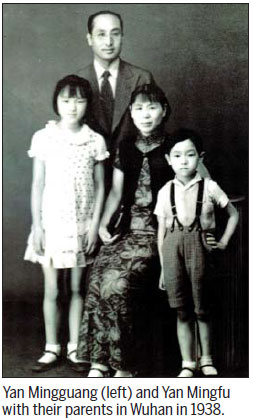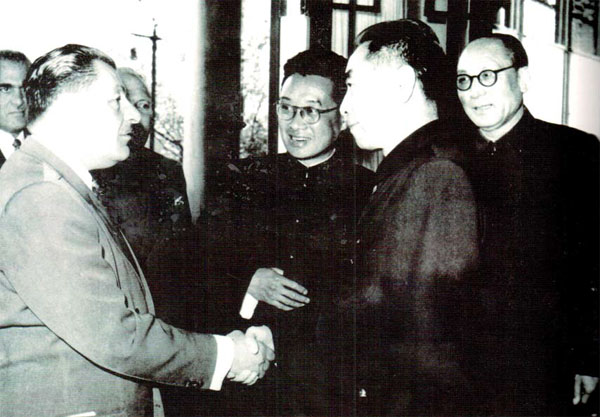The Chinese spy who saved the Soviets
Updated: 2015-08-28 08:31
By Zhao Xu(China Daily Europe)
|
|||||||||||
An effective intelligence agent, a trusted adviser to the Nationalist government and A covert Communist
As a child, Yan Mingguang regarded her father as a caring, uncomplicated man. "He would ride me to school on his bike and give me a goodbye kiss on the forehead when he left me at the dormitory. Once, I discovered a pair of nail scissors under my pillow. Dad had left them there because he wanted me to keep my fingernails short and clean," she says.
It was only when her father, Yan Baohang, died in 1968 that she discovered he had been a senior intelligence agent and had played a crucial role in alerting the Soviet Union to an impending invasion by the Third Reich in June 1941, just weeks before the Nazi troops were mobilized.
|
Yan Baohang (right) accompanies then-premier Zhou Enlai at a meeting with foreign guests in 1955. Photos provided to China Daily |
According to Guan Dingyi, secretary-general of the Yan Baohang Public Philanthropic Foundation, in Shanghai, Yan acquired the information when he attended a banquet held by the Chinese Nationalist government to welcome a visiting Germany envoy.
"One got a deeper perspective on the intricate and ever-changing international relationships during the war, and understood what was really happening," Guan says.
"Turn the clock back to June 1941: Germany was flexing its military muscles and the United States had yet to become involved in the war. Chiang Kai-shek, the leader of China's Nationalists, was trying to maneuver through an increasingly complicated political landscape in the hope of making gains by forming the right alliances."
According to Guan, Chiang had always been an admirer of the German military, and as principal of China's first military school, the Whampoa Military Academy, he purchased German-made weapons and invited several Germans to join the teaching staff.
By mid-1941, China was already four years into its war with Japan. Chiang saw the Germans as a potential mediating force, despite their having sided with the occupiers. "That was partly because Germany would want Japan to fight alongside her against the Russians," Guan says. "Gui Yongqing, China's military attache to Germany, was informed of the decision to attack the Soviet Union by his German hosts sometime in late May, and he alerted the Nationalist government.
"Why would they attack? My guess is that Hitler was trying to simultaneously coax and coerce Chiang into cooperating with him. 'The Russians will soon be finished, so come and join us' is effectively what he was saying. Judging by Chiang's reaction, he was betting on the Germans."
Yan was invited to the banquet because he was an adviser to the Nationalist government, but also a favorite of Chiang's wife, Soong May-ling. "My father said it was a very lively party, and people were toasting as if celebrating a victory," Yan Mingguang, now 88, says.
"A Nationalist veteran approached my father and told him, quite casually, about the German plan. Deeply shocked, my father sought confirmation from a guest who was close to Chiang. The answer was affirmative."
Yan, who had secretly joined the Communist Party of China in 1937, wasted no time in reporting to his superiors in Yan'an, where the CPC was headquartered, and the news was passed on to Moscow.

On June 22, 1941, Germany invaded the Soviet Union. Eight days later, Stalin telegraphed Yan'an to thank Yan "for his accurate information that prompted us to prepare for what's to come".
Early years
Born into a poor peasant family in Liaoning province in 1895, Yan earned the right to an education by standing outside the classroom window until a teacher took pity on him. In 1918, almost immediately after graduation from the local normal college, Yan opened a charity school for children from similar backgrounds to his own. He also befriended Zhang Xueliang, the son of Zhang Zuolin, who was known as the Warlord of the Northeast.
From 1927 to 1929, Yan, sponsored by Zhang Xueliang, studied at the University of Edinburgh and traveled across Europe. By the time he returned to China, the political situation had changed dramatically. Zhang Zuolin had been killed by the Japanese, who saw him as an obstacle to their ambitions in China, and Zhang Xueliang had declared his allegiance to the Nationalist government.
"Yan came back to help Zhang and do his duty for the country," Guan says. "In around 1934, Zhang introduced Yan to Chiang Kai-shek and his wife, Yan impressed the couple, and was soon invited to take a government post.
On Dec 12, 1936, Zhang, who had become disenchanted with Chiang's military strategy, gave orders for his superior to be kidnapped and detained in Xi'an, Shaanxi province. "Before that, Chiang had deployed a sizable part of the Nationalist army to wipe out the Communists, whom he saw as a threat," Guan says. "By detaining Chiang, Zhang hoped to force Chiang to cooperate with the Communists. After being held for several days, Chiang agreed to the formation of a united front against the Japanese and was released.
"Upon Chiang's release, Zhang accompanied him on a flight from Xi'an to Nanjing, the Nationalist capital at the time, and was immediately placed under house arrest."
According to a memoir Yan wrote in 1962, Soong and her brother, T.V. Soong, a prominent politician, invited him to a meeting three days after Chiang's return. They asked Yan to negotiate the release of a number of top-level Nationalist officials and 50 US planes that were under the control of Zhang's generals in Xi'an, in exchange for Zhang's eventual freedom. Yan brokered the deal, and the men and the planes were soon back in Nanjing. Zhang, however, remained under house arrest for half a century, first on the mainland and then Taiwan.
"My father felt cheated. In the first few years after the 'Xi'an Incident', he tried everything to gain Zhang's freedom, but in vain," Yan Mingguang says.
Yan Baochang and Zhang met for the last time in February 1937, and in September Yan joined the CPC and was tasked with collecting intelligence.
By the summer of 1945, Japan was the last Axis country still fighting, despite its hopeless situation.
"But Japan still had one trump card - the 1.2-million-strong Kwantung Army, stationed in Northeast China and seen as its mightiest force. It was at full strength and was expected to guard this last piece of ground 'for the Emperor', just in case the Japanese mainland fell," Guan says.
"The Americans hoped that the Soviets would attack and eliminate this giant army, but mindful of the powerful response it might unleash, Stalin hesitated. That's when Yan's crucial piece of information arrived."
The Soviet Communist Party had asked the CPC for assistance, and Yan learned that Nationalist intelligence agents had detailed information about the army's deployment and defensive plans.
"An old friend of Yan's happened to be the brother-in-law of the Nationalist official in charge of the classified files. After much persuasion, the official agreed to 'lend' the files to Yan for three days," Guan says. "It didn't take long for the information, which even included the names of low-level Japanese commanders, to reach the Soviets, who launched an attack on Aug 8, 1945. The move sealed Japan's fate, and the country surrendered on Aug 15."
After WWII, a civil war erupted between the Communists and the Nationalists, and Yan was at last allowed to reveal his true political leanings. When the People's Republic of China was founded on Oct 1, 1949, he was appointed to a number of posts, including that of deputy chief of staff at the Ministry of Foreign Affairs.
The bitter end
That prominence came to an abrupt end with the "cultural revolution" (1966-76). "My father was taken from home one night in November 1967. He died in prison on May 22, 1968," said Yan Mingguang. "There's no name on my father's death certificate, just a serial number. My mother passed away in 1971, still not knowing what had happened to her husband."
In 1978, a year after the end of the "cultural revolution", Yan's reputation was restored by the Chinese government.
In 1991, Yan Mingguang traveled to Hawaii to visit the 90-year-old Zhang Xueliang, who had been released from house arrest a year earlier.
"I told him what had happened to my father. Deeply saddened, Zhang, who had been the chief donor to the school my father founded in the northeast, proposed setting up a charity in my father's name. The Yan Baohang Public Philanthropic Foundation has existed for 24 years," she says.
Reflecting on her father's life, Yan Mingguang says he had been a patriot first and foremost. "Throughout his life, my father searched for a truth that would bring prosperity to China. He fell under the influence of Christianity, which drew him close to Soong may-ling, but he also looked into Buddhism and Taoism with great enthusiasm. Finally, communism changed his life.
"People saw my father as a man of immense social grace, and for me his charm came from his passionate, sympathetic heart," she says.
"Back in 1967, sensing his imminent arrest, my father told me about his intelligence work during the war for the first time. He told me: 'Always remember, your father is a good man'."
zhaoxu@chinadaily.com.cn
(China Daily European Weekly 08/28/2015 page29)
Today's Top News
Hungary scrambles to confront migrant influx
11 under investigation and 12 detained over Tianjin explosions
Up to 50 refugees found dead
in lorry in Austria
Net migration to UK hits record high
Suspect in Virginia TV shooting had history of workplace issues
Born in captivity, raised in freedom
Too hard to say goodbye to Tibet: China's Jane Goodall
Bank lowers lending rate to ease debts
Hot Topics
Lunar probe , China growth forecasts, Emission rules get tougher, China seen through 'colored lens', International board,
Editor's Picks

|

|

|

|

|

|







